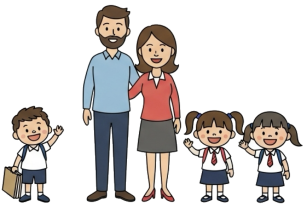
Question More, Action Knowledge.
Remember, at QMAK, we don’t just teach; we empower. We don’t just inform; we inspire. We don’t just question; we act. Become a Gold Member, and let’s unlock your child’s full potential, one question at a time.
 As parents and educators, we often focus on the external challenges our teenagers face, such as academic pressures, social dynamics, and the ever-present influence of technology. However, the book “Chatter” by Ethan Kross highlights the importance of addressing an equally significant internal challenge: the power of our inner voice.
As parents and educators, we often focus on the external challenges our teenagers face, such as academic pressures, social dynamics, and the ever-present influence of technology. However, the book “Chatter” by Ethan Kross highlights the importance of addressing an equally significant internal challenge: the power of our inner voice.
“Chatter” refers to the negative self-talk that can consume our minds, hindering our performance, well-being, and social connections. For teenagers, who are navigating a crucial stage of personal development, learning to manage their inner voice is a vital skill that can have far-reaching benefits.
One powerful technique discussed in “Chatter” is distanced self-talk. This involves referring to oneself in the second or third person, using one’s own name, as if advising a friend.
For example, instead of thinking, “Why did I fail that test?“, a teenager might ask, “Why did Sarah fail that test?“. This linguistic shift creates emotional distance, allowing for more rational thinking and reduced anxiety.
Parents and homeschoolers can teach this technique to their teens by encouraging them to imagine what advice they would give to a friend facing a similar challenge. This perspective shift can help teens reframe stressful experiences as obstacles to be overcome rather than insurmountable threats.
Another insight from “Chatter” is the impact of social media on our inner voice. Platforms like Instagram and TikTok can exacerbate negative self-talk by presenting curated versions of reality that promote social comparison. Teens may feel inadequate when exposed to seemingly perfect lives online, fueling insecurities and self-doubt.
To counteract this, parents can engage in open discussions with their teens about the reality behind social media posts. Emphasizing that everyone faces challenges, regardless of their online persona, can help teens develop a more balanced perspective. Additionally, encouraging offline activities, such as spending time in nature or engaging in creative pursuits, can provide a much-needed break from the constant digital chatter.
At QMAK, we understand the importance of nurturing a positive inner voice. Our philosophy emphasizes the development of the whole person, recognizing that a student’s mental well-being is just as crucial as their academic success. By incorporating insights from books like “Chatter” into our approach, we aim to equip students with the tools they need to navigate life’s challenges with resilience and self-compassion.
As “Chatter” illustrates, the power of belief can be harnessed to manage negative self-talk. Parents and educators can help teens develop positive expectations and beliefs about themselves, tapping into the placebo effect to promote a more resilient inner voice. This can be achieved through regular affirmations, goal-setting exercises, and celebrating small victories along the way.
Ultimately, helping teens manage their inner voice is a collaborative effort between parents, educators, and the teens themselves. By providing a supportive environment, practical techniques, and open communication, we can empower our teenagers to become the architects of their own inner dialogue, setting the foundation for a more confident and fulfilling future.

Remember, at QMAK, we don’t just teach; we empower. We don’t just inform; we inspire. We don’t just question; we act. Become a Gold Member, and let’s unlock your child’s full potential, one question at a time.